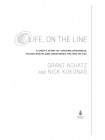Life, on the Line Grant Achatz (books to read to increase intelligence .TXT) 📖

- Author: Grant Achatz
Book online «Life, on the Line Grant Achatz (books to read to increase intelligence .TXT) 📖». Author Grant Achatz
At the urging of my friends I decided to press on, taking a few laps in town with the subwoofer thumping out Sir Mix-A-Lot. I headed to the school parking lot, then pulled a U-turn and headed toward a long, straight road right in front of the school.
I slammed my foot down on the accelerator and instantly the car slowed down. The tires were just spinning in place, smoking like crazy. Huge plumes engulfed the car.
The tires heated up and gained traction, and we shot forward like a rocket. My foot did not come off the gas until I had to brake hard for a stop sign at the end of the road. We could see the cloud of blue smoke trailing behind us, and we were positively giddy for about three seconds until my friend Mike saw the police car directly in front of us.
“Uh-oh.”
When the cop looked at my license he shook his head disapprovingly, “First day, huh?
My maternal grandfather was a retired fireman in St. Clair, and in his house you could always hear the blare of the police scanner. It didn’t take long for my mom to find out what we were doing that day.
The cop, too, must have figured out who I was, because he let me go with only a stern warning. Either that or he figured two tickets and a near miss were enough to set me straight. We resumed driving around town—very slowly—and ended up in the Burger King parking lot, chatting with some schoolmates and trying to find some girls, when my mom came rolling up to us.
She lowered her window, looked at me in the eye, and said, “Grant, you take that car home, and I mean right now!”
I was deflated and embarrassed in front of my friends and schoolmates. It had the intended effect.
On the weekends my friends and I organized camping trips on land that my parents had bought on Puttygut Road. It was an easy way for us to break free from the supervision of protective parents and stay out all night. We’d stock up on supplies at the Achatz Restaurant on the way out of town, eating dinner first then grabbing coolers full of eggs, milk, cheese, butter, sausage, bacon, and bread. We did it so frequently that my friends just walked in the back door like they owned the place. It was as though they were coming by my house.
I was the obvious choice to be designated the campfire cook. We would sit around the fire and talk about life in St. Clair. Most of us wanted to get out of there. Within our group, guys were applying to colleges, considering the U.S. Air Force, or taking computer classes in AutoCAD. There was genuine angst about what we wanted to do with our lives, how we could see the world beyond Michigan. But whenever talk came around to my ambitions, no one understood why I wouldn’t just take over my parents’ restaurant. They saw that I had plenty of toys, and my parents seemed relatively well-off. And they knew I was capable of running the place.
I assured them that that was not the case, and that I wouldn’t be staying in St. Clair. I had started thinking about culinary school and had read about the Culinary Institute of America in New York. I explained that I wanted to cook fancy food and one day own my own restaurant—a great restaurant. But my friends, who wrote me off as a deluded dreamer, laughed. Soon we were all wailing with laughter. But I thought, “If you can fly a fighter jet, great. But I’m going to own a great restaurant, a famous one.”
I had one long-term girlfriend throughout my school years, Cindy Morgan.
Cindy grew up on the other side of the metaphoric tracks. Her family was upper-middle-class, well educated, and fiercely Catholic. Her father, John, was a successful civil engineer and former Air Force pilot. She had two older sisters and a younger brother, all smart and engaging. The Morgan home was “on the river,” as was said in the town. The affluent families gathered along the St. Clair River in large homes situated close to boathouses, docks, and piers. Cindy and I started out as mutual friends of my first real crush, Stephanie Petrone. After Stephanie and I had a falling out, Cindy and I grew closer, transitioning as we grew older from friends, to best friends, to boyfriend and girlfriend.
I always felt slightly discomforted by Cindy’s family. They had an overt awareness of religion, social class, and educational achievement that made me realize I had a very different upbringing. I was a cook, after all, and that wasn’t—in my mind—a manly or lucrative career. Cindy always told me that it was my own insecurity that made me feel that way, and of course she was right. But I never liked going over to their home. I always felt like I didn’t measure up.
Knowing that her family was incredibly important to her, though, I always made an effort to spend time with them. In an effort to prove my worth to her father, or perhaps to myself, I offered to cook dinner one night.
Earlier that week I





Comments (0)